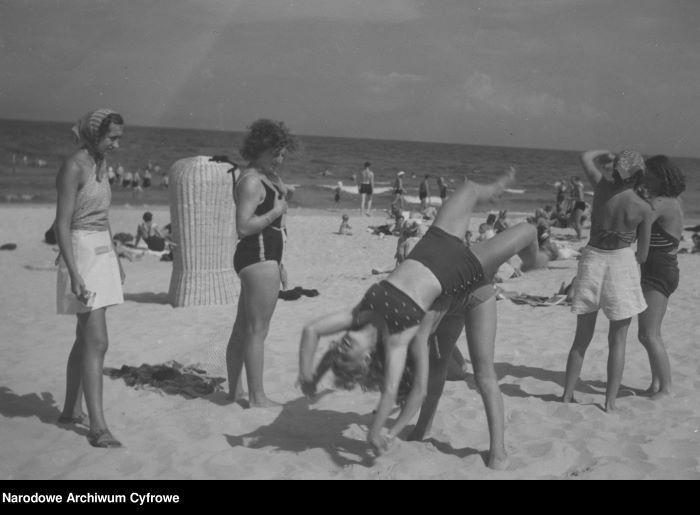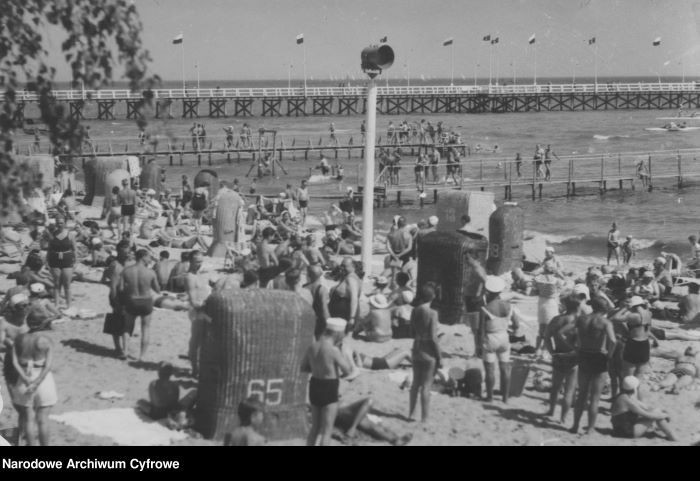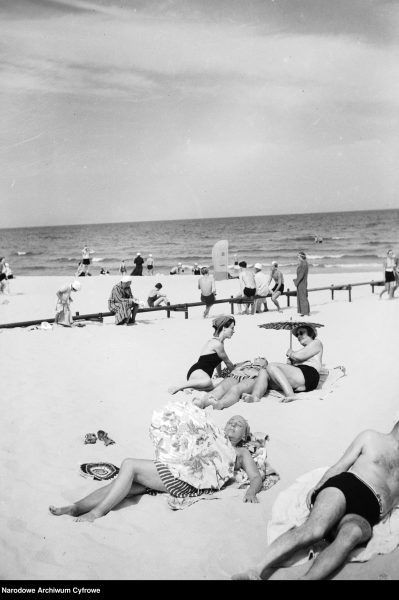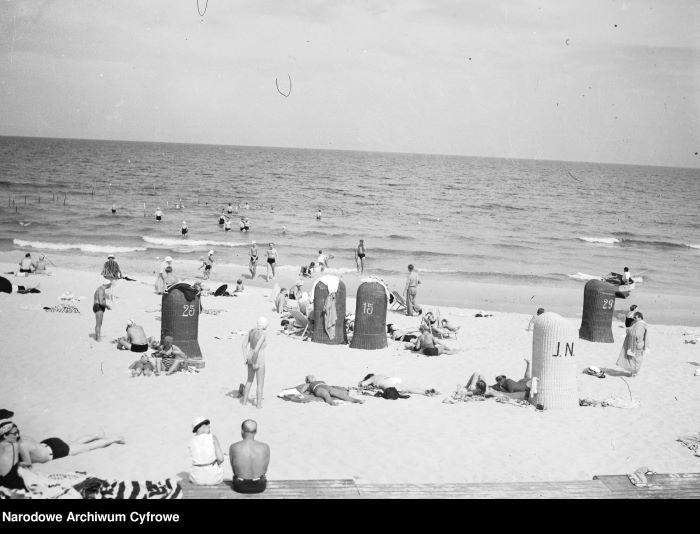The summer of 1939 was the last joyful moment before the outbreak of World War II. Raging youth, lovers, trains full to the brim with tourists headed for the Polish sea - the seemingly idyllic landscape of July and August 1939. But what did the Poles think and talk about? What did they know and what did they sense? What did the newspapers report at the time?
In the late spring of 1939, the thermometers at the seaside showed only a dozen or so degrees Celsius in the warmest parts of the days. Nothing foreshadowed neither a hot summer nor a sudden influx of tourists. However, the unexpected rise in temperature in June caused Poles to take a great interest in recreation by the Baltic Sea. Jurata, Jastarnia, Hel and Chałupy experienced a real siege . Both the rich and the poor, including large number of workers, reached the coastal towns thanks to social funds.

Beach people fun
Mediterranean climate
The omnipresent heat enjoyed sunbathers, and the water in the Baltic Sea reached even 27 degrees, not to mention even Saharan conditions on the dunes, where the temperature was over 50 degrees in full sun:
Sun is baking, the sea is fawning on fat legs. Ah! How nice. Resin is dripping from trees, a freckled gull sat on the stern, a summer vacationer from Kalisz, humming "Here in Lviv ..." eats Krakow's sausage.

Beach-goers while relaxing on the Baltic Sea. A separate bathing area is visible, a pier in the background.
The best entertainment? Only at the Polish seaside
Rooms in private houses and boarding houses, as well as spa houses, shops, cafes, parks and beaches were filled with entertaining tourists:
Tętni in Dom Zdrojowy [in Jastarnia] shuddering jazz, dozens of pairs of legs laboriously and persistently treading the "cozy" dance floor.
The hosts of Jastarnia tried to make the vacationers' stay more pleasant by taking care of the smallest details of the public space:
On the pure, white sea sand grow beautiful, color-ranging roses. This miracle was accomplished by the port wise men, who, having collected some fat black soil in Pomerania, brought it in the number of eight hundred wagons straight to Jastarnia, poured a handful of such soil under each bush and made a garden of their settlement full of flowers.
For holidaymakers looking for a break, Hel turned out to be an oasis of peace:
There are no summer temptations in the form of wasting the night with jazz clamor. And people here are not playing cards somehow. And you would look for a drunk in vain. […] Here you get up early, bathe, eat, take a walk in a beautiful forest and, losing track of time, go to bed after sunset. Rest is rest.

Beach-goers while relaxing by the Baltic Sea
Decent attractions and less ordinary
Summer vacationers could count on a great deal of experience. They relaxed on the beach, swam in the sea, admired historic places and lighthouses, visited fishing ports and city parks, sailed on cruise ships, where dancing parties or film screenings took place, and had numerous love excesses in the Gdynia forest :
The areas were so divided on the basis of unwritten contractual treaties that each bush has its regulars and no one gets into a parade, so to speak. One of our readers had the opportunity to observe through binoculars the administration of justice carried out by an energetic woman, who, stealthily, caught up with the unfaithful spouse at the right moment and beat him and the idolized bastard very severely.
The virtuous tourists were outraged by the skimpy outfits and heavy make-up of some beach-goers and considered them scandalous among the public:
Does the Polish society with healthy and moral thinking to these symptoms of disgusting and hideous demoralization among our ladies do not react? It is generally said that this "fashion" dictates, so you have to end such "fashion" as soon as possible, because it only sows moral rot among the most beautiful and subtle human beings.

Beach-goers while relaxing by the Baltic Sea
The specter of the war on the Baltic Sea
The wonderful peace, full of great attractions and relaxation, was disturbed by the information about international disasters circulating on the seaside beaches. This news among the public and in the press was considered exaggerated, intended to disrupt leisure, and it was predicted that the 1939 holiday season would be as long as the previous one. It was thought that:
[Disturbing signals] do not lie in the truth and, as it has been stated, are disseminated by envoys from foreign intelligence services. The Government Commissariat in Gdynia warns against wiretaps of various agents whose eyes see Polish calm and composure.
At the end of June 1939, the Days of the Sea began, which were wildly celebrated throughout Poland under the slogan "We will not be pushed away from the Baltic Sea", and in the very heart of Gdynia, at Grunwaldzki Square, over 80,000 participants pronounced the words of the sea rota, giving a promise that Poles would not give up the Free City of Gdańsk and Pomerania without a fight:
[We swore] Poland's eternal rights to the Baltic Sea and to guard its maritime destinies, to guard the estuary of the Vistula River, to support and defend our brothers behind the cordon - an inseparable part of the Polish nation. So help us God!
July and August 1939 for Poles was a time of anxiety and preparation for the worst, and on the other hand, to react and enjoy the moment of still lasting peace on those last sunny days.
Bibliography:
- M. Zaborski, We are still alive. Summer '39, Bellona 2019
- ABC-Daily News, July-August 1939
- Dziennik Bydgoski, July-August 1939
- Kurier Poznański, July-August 1939
